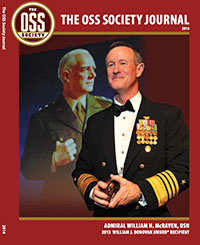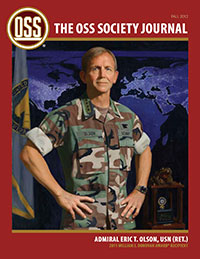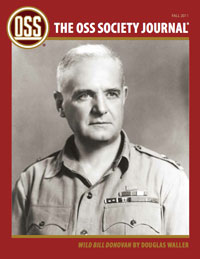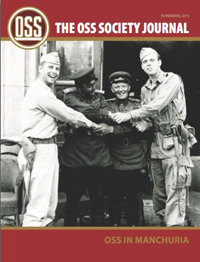'Basterd'ized History
September 2009 Author:Charles Pinck
Published in The Washington Times
By Charles T. Pinck
An 'inglourious' view of the intelligence services
Given the very close relationship between Hollywood and World War II's Office of Strategic Services (OSS), forerunner of the CIA and U.S. Special Operations Forces, whose ranks included director John Ford and actors Robert Montgomery and Sterling Hayden, it's troubling that Hollywood has distorted the history of the OSS in two recent major motion pictures, "The Good Shepherd" and "Inglourious Basterds."
These two movies present diametrically opposite but equally false assertions about the OSS, particularly about the important role played within the organization by Jews and other minorities.
In "The Good Shepherd," OSS founder Maj. Gen. William J. Donovan (portrayed as Gen. William Sullivan in the movie), recruits Matt Damon's character, a member of Yale's Skull and Bones, to join OSS by telling him, "We are looking for honorable and patriotic young men. No Jews, no blacks, and only a few Catholics."
The notion that Gen. Donovan -- a devout Catholic -- would say such a thing is preposterous. Nothing could be further from the truth.
By Charles T. Pinck
An 'inglourious' view of the intelligence services
Given the very close relationship between Hollywood and World War II's Office of Strategic Services (OSS), forerunner of the CIA and U.S. Special Operations Forces, whose ranks included director John Ford and actors Robert Montgomery and Sterling Hayden, it's troubling that Hollywood has distorted the history of the OSS in two recent major motion pictures, "The Good Shepherd" and "Inglourious Basterds."
These two movies present diametrically opposite but equally false assertions about the OSS, particularly about the important role played within the organization by Jews and other minorities.
In "The Good Shepherd," OSS founder Maj. Gen. William J. Donovan (portrayed as Gen. William Sullivan in the movie), recruits Matt Damon's character, a member of Yale's Skull and Bones, to join OSS by telling him, "We are looking for honorable and patriotic young men. No Jews, no blacks, and only a few Catholics."
The notion that Gen. Donovan -- a devout Catholic -- would say such a thing is preposterous. Nothing could be further from the truth.
Catholics in OSS included William E. Colby and William J. Casey, both of whom would become director of central intelligence. Jewish Americans in OSS included Moe Berg, Arthur Goldberg, Saul Steinberg and Budd Schulberg.
Ralph Bunche, who served in the Research and Analysis Division, was the first black to win the Nobel Peace Prize. Georg Olden was a pioneering graphic designer who would become the first black to design a stamp for the U.S. Postal Service and designed the CBS eye logo.
Gen. Donovan understood that America's racial diversity was its greatest strength, contrary to claims made by Nazi Germany that it was a weakness. He made full use of this advantage in building his intelligence agency, noting that no other country in the world had so many citizens with knowledge of other countries.
Gen. Donovan, no stranger to courage himself, remarked the OSS Operational Groups, which operated behind enemy lines in Europe and Asia, were made up of recent immigrants from countries there and performed "some of the bravest acts of the war."
In his September 1945 farewell address to OSS personnel, Gen. Donovan made specific reference to the organization's diversity: "We have come to the end of an unusual experiment. This experiment was to determine whether a group of Americans constituting a cross section of racial origins, abilities, temperaments and talents could meet and risk an encounter with the long-established and well-trained enemy organizations. How well that experiment has succeeded is measured by your accomplishments and by the recognition of your achievements."
(OSS was politically diverse, too. Julia McWilliams, who served in OSS and later would become famous as Julia Child, said of Gen. Donovan that "political views were irrelevant to the director. He valued creative intelligence, a love of adventures, and a willingness to fight the enemy.")
"Inglourious Basterds," the new movie by Quentin Tarantino, who evidently never saw "The Good Shepherd," has an OSS unit made up entirely of Jews whose mission it is to brutally kill Germans behind enemy lines by scalping them, carving swastikas in their foreheads and beating them to death with baseball bats. Such an OSS unit never existed. (There was a unit of Jewish commandos in the British army who went ashore on D-Day and performed valiantly throughout World War II.)
"Inglourious Basterds" loses its pretense as a fantasy when it attaches this fictional group of Jewish commandos to the real OSS, thereby giving even the most knowledgeable viewer the impression that this story is true.
Given the enormous amount of material about the OSS available to the public, including its personnel and operational files and numerous books, there are countless true stories about bravery behind enemy lines that could be told.
The fictional "Basterds" may serve the film's purpose, but they do disservice to the history of the OSS.
Ralph Bunche, who served in the Research and Analysis Division, was the first black to win the Nobel Peace Prize. Georg Olden was a pioneering graphic designer who would become the first black to design a stamp for the U.S. Postal Service and designed the CBS eye logo.
Gen. Donovan understood that America's racial diversity was its greatest strength, contrary to claims made by Nazi Germany that it was a weakness. He made full use of this advantage in building his intelligence agency, noting that no other country in the world had so many citizens with knowledge of other countries.
Gen. Donovan, no stranger to courage himself, remarked the OSS Operational Groups, which operated behind enemy lines in Europe and Asia, were made up of recent immigrants from countries there and performed "some of the bravest acts of the war."
In his September 1945 farewell address to OSS personnel, Gen. Donovan made specific reference to the organization's diversity: "We have come to the end of an unusual experiment. This experiment was to determine whether a group of Americans constituting a cross section of racial origins, abilities, temperaments and talents could meet and risk an encounter with the long-established and well-trained enemy organizations. How well that experiment has succeeded is measured by your accomplishments and by the recognition of your achievements."
(OSS was politically diverse, too. Julia McWilliams, who served in OSS and later would become famous as Julia Child, said of Gen. Donovan that "political views were irrelevant to the director. He valued creative intelligence, a love of adventures, and a willingness to fight the enemy.")
"Inglourious Basterds," the new movie by Quentin Tarantino, who evidently never saw "The Good Shepherd," has an OSS unit made up entirely of Jews whose mission it is to brutally kill Germans behind enemy lines by scalping them, carving swastikas in their foreheads and beating them to death with baseball bats. Such an OSS unit never existed. (There was a unit of Jewish commandos in the British army who went ashore on D-Day and performed valiantly throughout World War II.)
"Inglourious Basterds" loses its pretense as a fantasy when it attaches this fictional group of Jewish commandos to the real OSS, thereby giving even the most knowledgeable viewer the impression that this story is true.
Given the enormous amount of material about the OSS available to the public, including its personnel and operational files and numerous books, there are countless true stories about bravery behind enemy lines that could be told.
The fictional "Basterds" may serve the film's purpose, but they do disservice to the history of the OSS.







